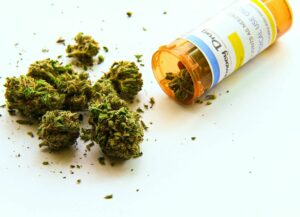The Brookings Institute, a nonprofit research and policy think tank,
recently released a paper entitled "Ending the U.S. government’s war on
medical marijuana
research."
In it, authors John Hudak and Grace Wallack call on officials to stop
impeding research into cannabis, especially in light of the increasing
number of states that are legalizing medical marijuana. In a country
where 76 percent of
doctors
approve of medical marijuana, 24
states
have legalized medical cannabis and seven more
states
are on the precipice of approval, it’s confusing that the federal
government would continue to throw up major roadblocks that interfere
with adequate and important research.
From the Brookings paper, researchers Hudak and Wallack boldly state
that, "It is time for the federal government to recognize the serious
public policy risks born from limited medical, public health and
pharmaceutical research into cannabis and its use." It’s their fear,
they explain, that increasing usage – in both the medical and
recreational realm – may be putting patients and partakers at risk
because cannabis hasn’t undergone some of the stringent testing and
approval phases that the FDA imposes on other medicinal substances. An
autumn 2014 compilation of statistics suggests that there may be more
than 2.4 million medical marijuana
patients
in the U.S., and this doesn’t include the recreational users in Colorado
or Washington, two states that have recently changed their cannabis
laws.
In one
critique
published after the release of the Brookings paper, blogger, lawyer and
Ohio State law professor Douglas A.
Berman
adds his voice in calling for the government to stop impeding important
research into the benefits of medical cannabis. As part of the law
professors blog network, Berman routinely writes about marijuana law,
policy and reform,
often highlighting how people on the national stage react and respond to
the issue of medical cannabis, and what, in particular, is impacting his
home state of Ohio. He also pointed to a Gallup
survey
that showed 58 percent support for marijuana legalization across all age
groups, with the support ratio rising to two thirds for those under 50
years of age.
It’s that same support by the common man, and by even more doctors, that
has the Brookings’ paper authors so very concerned. While some groups
may point to the dangers of marijuana, typically referring to its
recreational use while ignoring its medicinal value, Hudak and Wallack
simply point out that we, as a whole, may not yet fully understand
cannabis intimately enough to continue relying on it as a medicine
before more depth is achieved through scientific study.
And on that issue, there isn’t much dissent. In fact, news articles
continuously appear from respected news outlets like
Newsweek
and USA
Today,
bemoaning the dearth of research studies on marijuana due to federal
barriers. USA Today, in particular, points out that the federal
government spent 1.1 billion dollars from 2008 to 2014 to study
marijuana from the stance of how it could be abused or how addictive it
might be. Less than 300 million dollars – a mere quarter of the total
amount spent – actually went to research on how marijuana could actually
be beneficial to patients.
Looping back to the high percentage of doctors who approve of medical
marijuana or would prescribe it themselves if already legal or pending
legalization in their states, it would be hard to find a bigger
opponent-turned-proponent than CNN’s Dr. Sanjay Gupta. Several years
ago, he penned an important piece on exactly why he changed his
mind
and why other doctors might consider doing the same. He points out that
he "mistakenly believed the Drug Enforcement Administration listed
marijuana as a schedule 1 substance because of sound scientific proof,"
only to find that "they didn’t have the science to support that claim."
Beyond that, he began to look closely at medical cases where medical
marijuana made a huge difference in the lives of patients where
traditional FDA-approved substances failed. In particular, he looked to
the case of a little girl in Colorado named Charlotte who was able to
break free from a hugely destructive cycle of seizures by taking a
specific blend of medical cannabis.
In short, for Dr. Gupta, seeing was believing. Along the way, Gupta also
tore down old beliefs about marijuana’s addictive or destructive
properties, many of which were based on personal beliefs in the absence
of sensible research. He also found "hundreds of journal articles,
mostly documenting the benefits" dating "between the years 1840 and
1930."
Between Gupta’s well-respected medical opinion, the paper penned by
Brookings’ writers Hudak and Wallack, high levels of support in the
medical community and rising levels of support amongst the general
population, it would seem that the writing is (finally) on the wall.
Perhaps more acceptance in general will lead to more approval and less
restriction at the governmental level. That approval would open the
floodgates for meaningful research and may benefit millions of patients.
In fact, millions of patients already achieve health benefits through
the use of cannabis in states that already allow its prescription and
use. Tens of millions of patients suffering from all types of
ailments, such as
migraine
headaches,
multiple
sclerosis,
chronic
pain,
glaucoma,
diabetes,
depression
and
AIDS
may also benefit from loosened restrictions on medical marijuana.






